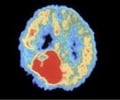
"Successful chemotherapeutics convert the tumor into a therapeutic vaccine, hence mobilizing the host's immune system against the cancer," explains senior author Dr. Guido Kroemer, of the Institut Gustave Roussy, in France.
Dr. Kroemer and his colleagues found that when chemotherapy kills and bursts open cancer cells, the cells release a factor called ATP. The factor recruits immune cells to the tumor site, where they are educated to acquire their function—namely, to ingest and present tumor proteins on their surfaces. The researchers found that when these trained immune cells are blocked, chemotherapy (specifically, anthracyclines) cannot efficiently reduce the growth of tumors in mice. Also, when these trained immune cells are injected into other mice, the mice can fight off cancer cells that are subsequently injected.
The findings point to a new strategy to improve cancer treatments. "Anticancer therapies and immunotherapies might be combined in a way to optimize the local recruitment and function of immune cells—for instance, by increasing extracellular ATP levels—with the goal of boosting the chemotherapy-induced anticancer immune response," says Dr. Kroemer. Also, measuring the recruitment of immune cells to tumor sites after chemotherapy might help predict how well a patient's cancer will respond to the treatment.
Source-Eurekalert












